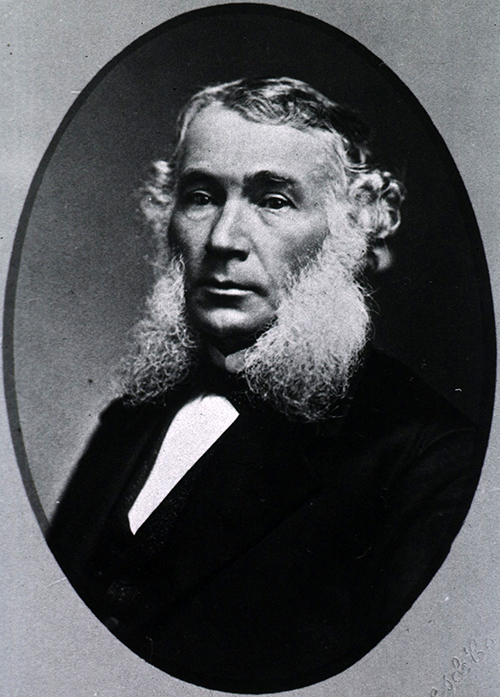A manual of military surgery: prepared for the use of the Confederate States Army by order of the Surgeon-General. Richmond: Ayers & Wade, 1863.
“Indigenous remedies of the South.” [In] Confederate States medical and surgical journal 1 (1864): 106-08.
 Samuel Preston Moore, a native of Charleston, South Carolina graduated from the Medical College of the State of South Carolina in 1834 and quickly became assistant surgeon for the United States Army in 1835. This position required service in several frontier regions of the country, including Missouri, Kansas, Florida, and the Texas-Mexico border. While serving in the Mexican War (1846-48), Moore met the future President of the Confederacy, Jefferson Davis, who was quite impressed with his organizational and disciplinary abilities (Rutkow, Manual of milit. surg., vi). Moore was promoted to surgeon in 1849 and remained in this position through the 1850s. However, like many Southern officers in the United States Army, he was in crisis at the brink of the Civil War. When his home state of South Carolina seceded, he resigned his post in the U.S. army and moved to Arkansas to open a private practice and to avoid fighting against a country he had devoted so much of his life to. However, he began receiving personal requests from Jefferson Davis to join the Confederate army. Davis’ descriptions of the army’s unfortunate military situation and the lack of trained medical men eventually persuaded Moore to become surgeon-general in 1861, a position he would hold for the duration of the war (Rutkow, Manual of milit. surg., vii).
Samuel Preston Moore, a native of Charleston, South Carolina graduated from the Medical College of the State of South Carolina in 1834 and quickly became assistant surgeon for the United States Army in 1835. This position required service in several frontier regions of the country, including Missouri, Kansas, Florida, and the Texas-Mexico border. While serving in the Mexican War (1846-48), Moore met the future President of the Confederacy, Jefferson Davis, who was quite impressed with his organizational and disciplinary abilities (Rutkow, Manual of milit. surg., vi). Moore was promoted to surgeon in 1849 and remained in this position through the 1850s. However, like many Southern officers in the United States Army, he was in crisis at the brink of the Civil War. When his home state of South Carolina seceded, he resigned his post in the U.S. army and moved to Arkansas to open a private practice and to avoid fighting against a country he had devoted so much of his life to. However, he began receiving personal requests from Jefferson Davis to join the Confederate army. Davis’ descriptions of the army’s unfortunate military situation and the lack of trained medical men eventually persuaded Moore to become surgeon-general in 1861, a position he would hold for the duration of the war (Rutkow, Manual of milit. surg., vii).
When Moore joined the Confederate army, they were already facing many medical-related difficulties, such as shortages of medicines, supplies, and equipment caused by the Union blockade of Southern ports and a lack of trained surgeons. Moore addressed all of these problems. He introduced a new type of large, one-story pavilion hospital and arranged for their construction throughout the South. He established an effective army hospital and field ambulance corps. Moore is also remembered for his resourcefulness in supplying the army with much-needed drugs by creating laboratories to prepare medications from indigenous Southern plants (Assoc. of the Med. Officers 3; Kelly & Burrage 865). In one issue of the Confederate States medical and surgical Journal (January 1864 – February 1865), a journal Moore started and directed, there is an article by him discussing the medicinal properties of Southern plants and criticizing the American Medical Association for not demanding that the blockade be lifted for medicines (Freemon 98-99). This article, “Indigenous remedies of the South,” is held at the Reynolds-Finley Historical Library within a bound volume of the journal from 1864-65.
Moore also instated measures to improve the quality and education of the Confederate army doctors. He set up an examination system that weeded out untrained doctors. If an examinee failed, he could be redeemed by serving as a hospital attendant and later retaking the exam (Freemon 40). In this way doctors who needed improvement were identified and trained. Also, Moore worked to increase the professional and technical knowledge of Confederate doctors by forming a professional organization, the Association of Army and Navy Surgeons of the Confederate States, founding the journal mentioned above, and compiling A manual of military surgery (1863). This manual is a collection of papers by surgeons which provides exact instructions (with drawings) for performing operations. It was intended for use by inexperienced surgeons in the army (Freemon 98). The Reynolds-Finley Library has a first edition of this 1863 publication.
Image: Samuel Preston Moore, Courtesy of the National Library of Medicine.
